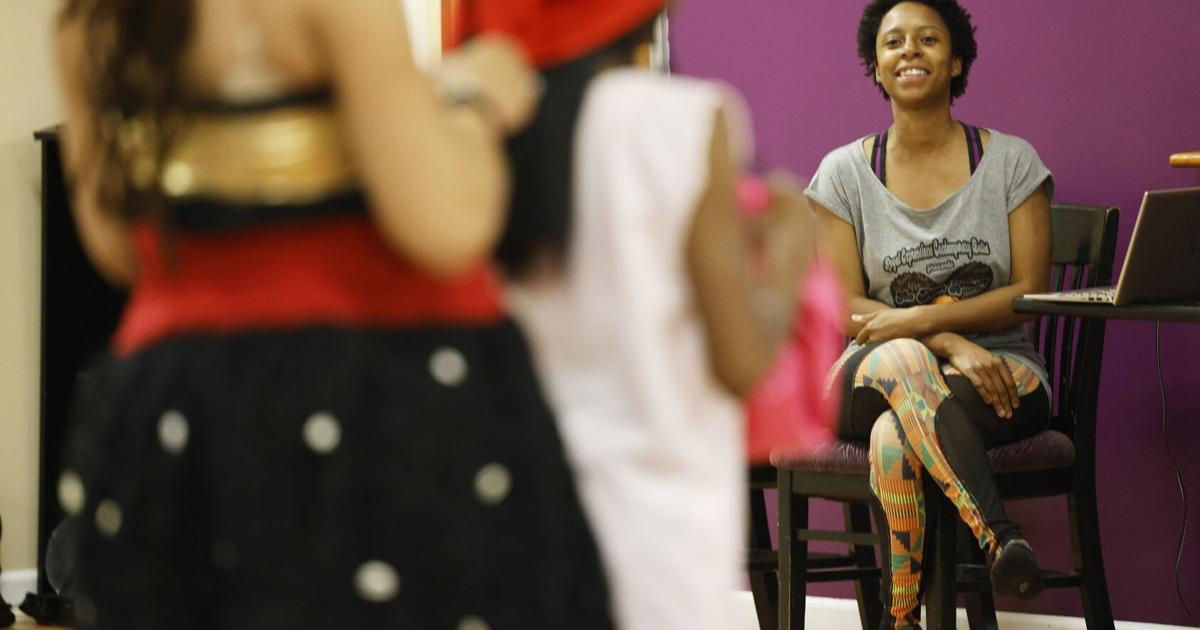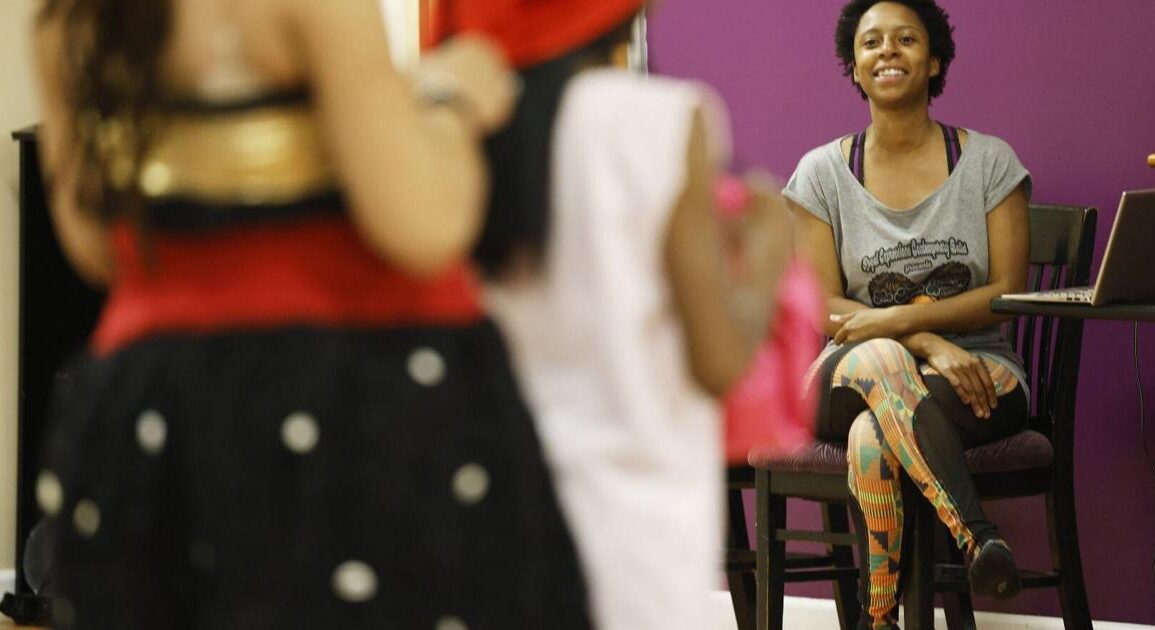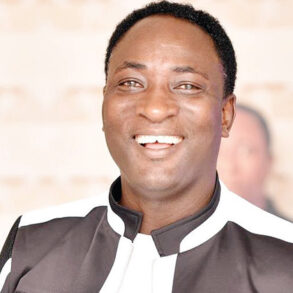
GREENSBORO — Princess Johnson earned two prestigious art grants for her unconventional ballet on the often complex relationship between Black women and their hair.
“The Hair Journey” will premiere Tuesday in Greensboro with a live orchestra and 22 dancers who will all be on the same stage at the same time at one point. Johnson wrote the story highlighting Black hair and culture while eight months pregnant during the COVID pandemic.
Yet the foil: the UNCG dance major knows she has an audience out there ranging from Black women to people who just love a great ballet.
Other artists in differing forms have similarly tackled the theme of Black hair. Actor Chris Rock’s documentary on the Black hair care industry was a hit in theaters. India Arie’s “I Am Not My Hair,” and Willow Smith’s “Whip My Hair” have topped the charts with songs giving homage to Black hair.
People are also reading…
Still, Johnson’s ballet is fighting against empty seats.
After years of planning, it has come down to Tuesday’s night premiere. And while that might work with big production companies in New York City, Johnson knows from slow ticket sales that mid-week might be a deterrent for some.
It wasn’t planned.
After searching for a theater in Greensboro, the founding director of the Royal Expressions Contemporary Ballet was unable to book anything on a weekend within two years to fulfill her end of one of the grants she received to produce the show.
That means people who might be interested would likely think twice about traveling from out of town on a weekend. Johnson has secured a venue in Winston-Salem for another show in May, but it will be repackaged by then as a touring production and won’t have a live orchestra.
“As a result, we reluctantly accepted the only date we were able to book in Greensboro, a Tuesday night at the UNCG Auditorium, because it was important to me that this event happen in Greensboro first,” Johnson said. “This setback has made it difficult to attract out-of-town audiences as we had hoped would help us fill seats, so we are reliant on our local community to show up to this event.”
Her nervousness is showing.
The dancer who also runs her own professional dance company, along with a school of dance and outreach programs for the community, grew up in Greensboro and earned a degree in dance from UNCG. Her original shows have told the stories of the human experience from pursuing dreams, to womanhood, to infertility.
“The Hair Journey” tells the story of Zuri , who goes on a journey where she meets the Weave Queen and Nywele, Queen of the Land of Locs and Fros — which give homage to popular hairstyles for hair that naturally ranges from ultra kinky to super fine.
She learns to love her hair just as it is but there’s no condemnation of the way others choose to wear their hair. This show chronicles and highlights what almost every Black girl and woman goes through as she grows up and shapes her identity through choices she make about her hair and the pressures society puts on her to wear it a certain way, Johnson said.
A special theme is the bonding that takes place between a mother and a child because of the cultural ritual, which is more involved than with other types of hair. There are three scenes in which the mother is doing her child’s hair.
“We wanted to show how ritualistic it was, how important it was that they sit down and take care of her hair,” Johnson said. “And just the bonding moments, the argument and fussing and all the emotions. It’s a coming-of-age story of the child wanting to wear her hair the way she wants to wear her hair and the mom wanting to do it the way she wants to do it.”
There’s no speaking parts. It’s not a play. It’s also not what others might expect ballet to be.
Ballet, she says, is simply storytelling through dance.
All kinds of story-telling and dance, says Sharneisha Joyner, who is a graduate of UNCG’s College of Visual and Performing Arts (CVPA) and composed the ballet’s original music and soundtrack, which includes jazz and Afrobeats.
“When someone thinks of ballet, they think of these otherworldly and grand myths and tales or even just stories that sometimes we can enjoy but can’t relate to,” Joyner said. “I think there is something timeless and special about seeing a work where you can place yourself on that stage, in that story, and feel like your life was made into a work of art. “
Joyner doesn’t want to give away surprises within the ballet, but the collaboration on the music was inspiring, she said.
“There’s this moment that I can best describe as a ‘quintessential community gathering’ without spoiling anything cool and she wanted specifically to virtually touch across as many examples of Black music as possible,” Joyner said. “And I think that is such a big thing musically because the conversations of ‘what is Black music’ has been researched in musicology heavily for a while, and recent releases from pretty large artists are actually shedding truthful light on the fact that a lot of ‘American music’ began in the Black communities.”
It was January 2021, during the early days of the pandemic, that the story came to Johnson as she considered a story about Black people and their culture.
“The first thought was it would be about our hair because it’s defining,” Johnson said. “Besides our skin color, the next thing that people usually see is our hair. I wrote it out with a pencil that my husband had left behind — the first thing I saw — and everything just flowed out of me.”
A friend introduced her to a composer who typically would have been perfect. But something kept gnawing at her.
“I said, this deserves a Black woman,” Johnson said.
The choreography is made up of classical and more modern moves that people can quickly identify.
She knew she had hit upon something special by the grants and the way she felt explaining it.
Now she just needs to get this unconventional ballet to an audience.
Johnson is the first to say that she’s been here before.
She had taken an unconventional path to the arts. She didn’t take classical dance lessons as a child but was choreographing her own moves and improvisation by the age of 8, But her techniques were lacking.
When she went to UNCG to major in dance, she auditioned three times but did not get in. She had a teacher, Eluza Santos, who wrote a letter asking that she be given a chance. She was then determined to make sure students who have a passion for dance have access to dance whether in a studio setting or in an outreach setting.
She left Greensboro and would later intern at the Richmond Ballet, but returned years later and started the dance company in 2009. While at UNCG, she had also shored up her entrepreneurial skills through the Bryan School of Business and Economics.
On its fifth anniversary, the company hosted Misty Copeland, the first African American Female Principal Dancer with the prestigious American Ballet Theatre. Johnson would later earn the American Ballet Theater Dance Teacher Certification for younger students.
Performance companies know that sometimes their best work may not sell out. She has looked out during performances and there are maybe 10 people in the audience—with every person in a seat deserving for her and the others to dance their hearts out.
She says “The Hair Journey” is designed to appeal to that broader audience. The live orchestra and performance, set design, and custom-made costumes have also made it a high-ticket production, which she says could make it out of reach for some families.
She was awarded a two-year grant in the fall of 2022 from the NC Arts Council, which was hoping to attract new audiences to the arts, to help prepare it for the stage. She was also able to secure some research funds in 2023 from Creative Greensboro when she did her residency last year. But she has been unable to secure any other sponsors.
She reached out to over 50 local, regional, and national possible funders and was told no by all.
“Or not even given an opportunity to share this wonderful project,” Johnson said. “However, we have pushed ahead and we are relying on ticket sales to get us to the finish line on this project.”
This post was originally published on this site be sure to check out more of their content.








